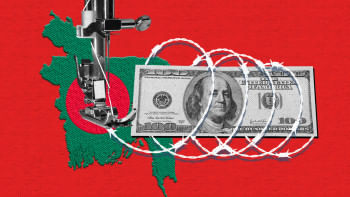Partial tariff relief is a hard-won victory

In securing a 20 percent tariff rate from Washington, Dhaka has navigated a perilous new era of US trade diplomacy. The immediate reaction is justifiably one of relief. A potential 35 percent tariff, which would have been catastrophic for the country's primary export engine, has been averted. This is a hard-won victory for Bangladesh.
Yet, this relief should be tempered with a sober understanding of the new reality. While National Security Adviser Khalilur Rahman rightly praised the outcome as "good news," the more measured comments from Commerce Adviser Sk Bashir Uddin are equally telling. His admission that Bangladesh "expected a rate below 20 percent" reveals the fine print of modern transactional diplomacy: a win is not about achieving the ideal, but about securing a competitive position in a world of hard bargains. The new 20 percent benchmark, applied under the reciprocal trade framework, will stack atop the country's existing average tariff of 16 percent, pushing the total levy to 36 percent. While steep, the rate remains workable, precisely because it is not unique to Bangladesh. The same formula applies to all nations, ensuring the country stays competitive with key rivals.
Indeed, the outcome keeps Bangladesh in lockstep with Vietnam, Sri Lanka, and Indonesia, and only marginally behind Pakistan's 19 percent. The contrast comes from the fate of India. Hit with a punitive 25 percent tariff, New Delhi's experience demonstrates that in President Donald Trump's Washington, strategic partnership alone is no longer a shield. Access to the world's largest consumer market is now explicitly tied to a country's willingness to align with American priorities.
The price of this access is clear. Bangladesh's negotiators wisely focused their commitments on purchasing US agricultural products, a move that serves food security goals and fosters essential goodwill. That was an astute concession. It illustrates that successful negotiation is no longer confined to tariff percentages but requires a holistic approach, linking trade to everything from food policy to strategic cooperation.
Therefore, this episode must serve as more than a momentary success; it must be a blueprint for the future. The era of predictable, rules-based trade relations is giving way to a more fluid and demanding environment. The White House has declared that each country's tariff rate reflects the "depth of its commitment" to US interests. Dhaka has proven it can meet this challenge, but the demands will not cease. The government should be applauded for securing this initial victory, as a failure to do so would have disrupted exports to the country's single biggest market. But the key takeaway is that such negotiations are the new normal. Bangladesh must now institutionalise this capacity for agile, interest-based statecraft. The hard work of navigating this complex new world order, where every trade benefit comes with a cost, has only just begun.

 For all latest news, follow The Daily Star's Google News channel.
For all latest news, follow The Daily Star's Google News channel. 






Comments